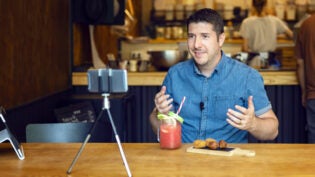If you’re still resorting to traditional advertising methods for promoting your small business, consider this: This year, U.S. adults will spend 23 percent more time on mobile devices than in 2013.
Mobile advertising is no longer reserved for big-name brands with impressive budgets. In the same way Google made it easy to set up and run a pay-per-click campaign, Facebook makes it possible for a small company to get a Facebook campaign up and running in 10 minutes.
But before Facebook broke the paradigm, few thought companies could successfully market to a mobile user. Facebook has proved that it’s possible to generate a positive ROI by using targeted tools such as Custom Audiences. Most big brands have made the move to mobile, and small brands are catching up quickly.
Divas SnowGear, a Wisconsin-based company that makes outerwear for women snowmobile riders, has discovered the power of targeting buyers on Facebook. It used traditional print and banner ads on snowmobile websites before realizing that 99 percent of this readership is male. After switching to Facebook ads, the company can now target women who prefer certain snowmobile manufacturers or athletes.
Today, 189 million Facebook users are mobile only, and mobile generates a third of Facebook’s ad revenue. The potential in mobile advertising is vast, but if you want to get ahead of the curve, you need to know your options.
Viable Mobile Options for Your Small Business
As a small business owner, you have several routes you can take to reach mobile users. While Facebook has simplified mobile advertising for small businesses, there are many platforms you can leverage to meet your audience members where they are.
- Facebook: Look at Facebook first. The targeting options are too powerful to pass up. For example, you can upload your email list, and Facebook will match all of the emails it can and create a custom audience for you. You can then target that audience or one with similar interests and behaviors.
- Digital Ad Networks: There are hundreds of digital ad networks, so identifying your target market and finding networks that reach this demographic is crucial. For instance, if you’re selling automotive parts, you should target websites and blogs that cater to men, such as sports-related sites. Some work with the Facebook ad network while others don’t. If that’s important to you, make sure it has Facebook in its network.
- Pinterest: On Pinterest, your product does all the work for you. A pin works to promote your product without the advertising jargon. If people like the product in the picture, they can click and be directed to the product on your site. It doesn’t get any easier than that.
- Instagram: Like Pinterest, Instagram posts serve as promotional material. If your products have a visual appeal — as in fashion, crafts, or furniture — getting your image in front of the right audience can be a powerful and compelling tool. Unlike Pinterest, you can’t link back to your site on Instagram, so it’s more difficult to direct viewers to purchase. But Instagram will likely figure out a way to work with brands to drive engagement and monetize its site in the near future.
Taking the Plunge
Making the shift to mobile advertising might seem daunting, but the exposure and targeting options it provides your small business are well worth it. To simplify and direct your efforts, start with these four steps:
- Get your site ready. First and foremost, know how your site performs on each mobile device — iOS and Android smartphones, as well as tablets. If your user experience is weak on Android, target only iOS users until you can fix your site.
- Segment, segment, segment. Study your potential customers so you can tailor the right message to the right group. This includes geo-targeting. Knowing where your customers are can help you deliver more relevant, personalized ads.
- Hire an expert. You probably know plenty of Internet-savvy individuals, but developing and deploying ads isn’t something you should take lightly. Your credibility and integrity depend on it. Find someone who knows how to develop an ad that converts by doing A/B testing and who uses professional tools such as Optimizely, Crazy Egg, or Lucky Orange.
- Close the deal. Provide a clear call to action. When someone clicks on your ad, what do you want him to see or do next? Have a plan for each step of the customer’s visit, and make sure you put the necessary guides in place.
Mobile advertising has exploded and will only continue on an upward trajectory. From 2013 to 2014 alone, mobile advertising spend in the U.S. is on track to increase by more than $8 billion. And by 2017, it’s expected to top $47 billion.
If you want to get ahead of the game, shift your advertising efforts toward mobile and learn to do it well. Then, you can reach your customers with ease and be prepared to take on future trends in the mobile ad space.
How is your small business capitalizing on mobile advertising?
Clay Bethune is a successful entrepreneur and co-founder of 9th & Elm. Clay has been an entrepreneur for more than 15 years and has started and sold many businesses in various industries. His passion is taking an idea from a simple concept and turning it into a profitable endeavor. He’s constantly working on perfecting efficient processes and loves problem solving, all things “startup,” and brainstorming with young entrepreneurs about the next big thing. Clay is married to Elly, his business partner and co-founder of 9th & Elm.
Additional Resources
3384 Views












